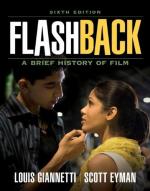
|
| Name: _________________________ | Period: ___________________ |
This quiz consists of 5 multiple choice and 5 short answer questions through Flashback: A Brief History of Film Chapters 13-16.
Multiple Choice Questions
1. Which director from Germany became known for his films about history with injections of off-handed comedy?
(a) Fritz Lang.
(b) Sergei Einstein.
(c) F.W. Murnau.
(d) Ernst Lubitsch.
2. From what country did director Ingmar Bergman come?
(a) Norway.
(b) Germany.
(c) Sweden.
(d) Italy.
3. What was the name of the period in England from 1963 to 1970?
(a) Overt Cockney.
(b) Sex Pistol's Penance.
(c) Swinging England.
(d) Angry Young Man movement.
4. As studios struggled to find the balance between pragmatism and idealism in the early decades of the Golden Age, which of the following people was not one of the great directors to innovate filmmaking in this period?
(a) Frank Capra.
(b) John Ford.
(c) Ernst Lubitsch.
(d) Max von Manderling.
5. In the first several decades of the film industry, European films focused on the artists, while American films focused on the _______.
(a) Sociological value.
(b) Entertainment.
(c) Story.
(d) Political statements.
Short Answer Questions
1. What was the name of the cultural movement in Czechoslavakia during the sixties?
2. What was encouraged by the New Wave filmmakers?
3. In what year did Edison help to open a Kinetoscope parlor?
4. What film helped open up the world to the power of British filmmaking in the 1930s?
5. What was one reason comedy shorts became so popular in the 1920s?
|
This section contains 249 words (approx. 1 page at 300 words per page) |

|




